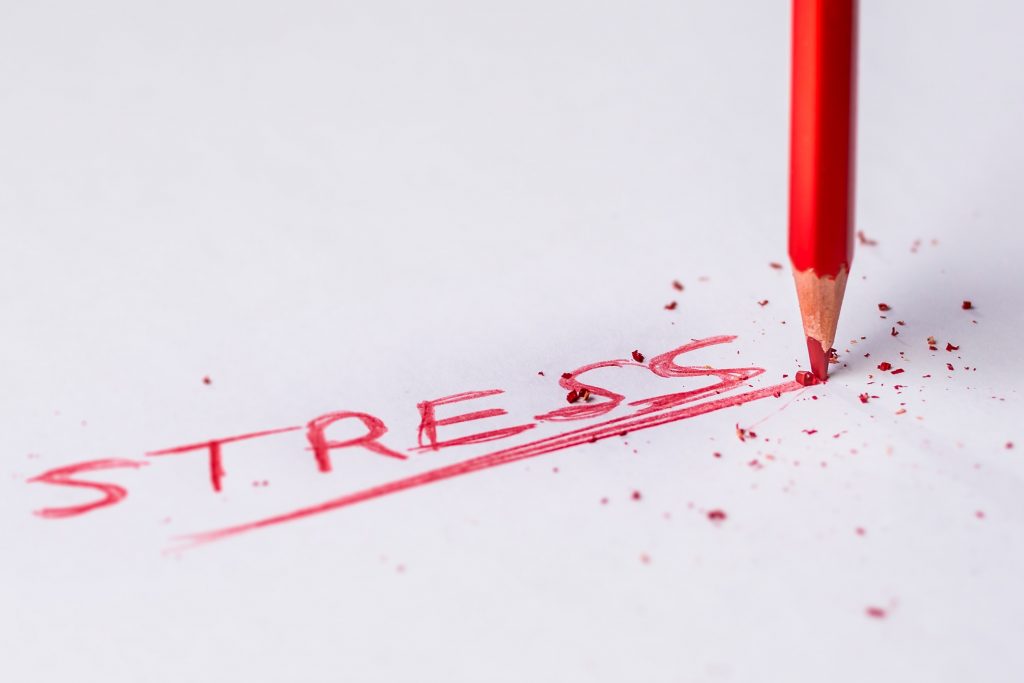A looming deadline, a boss that doesn’t stop nagging for updates, or a coworker whose comments can seem more like politely-worded insults: at some point or another, we all experience stress related to work. When it’s a rare occurrence for crunchtime, we can power through and recover during the more relaxing period that follows. However, over time, a toxic or highly-stressful workplace can take its toll and impact our mental health.
In some cases, it’s not even necessarily a toxic workplace. As people we’re simply prone to a varying degree of concern throughout our lives. Balancing work and home life, relationships, and everything else can be taxing. When we rely on work to provide for ourselves, or when we’re regularly weighed on by responsibilities at work, it can have a significant impact on our stress levels and mental well being.
Stress at Work

From the responsibilities of the job itself to bosses, coworkers, or even the commute, work exposes us to many stress factors. Perhaps your job responsibilities are unclear, and that’s a source. When we don’t know what is expected of us, the uncertainty of our situation can lead to stress.
While a challenge at work might offer some greater satisfaction for overcoming it, an overly-demanding job will only leave us stressed out. If you’re regularly working under a series of tight deadlines, with a million things to get finished at the same time, the pressure can compound and stack up before you know it. This is particularly true if the excess workload is always on your plate, rather than spread across a whole team or department.
For many people, that stress is further compounded by job security concerns. Not only is handling the work itself a factor, but the fears of what might happen if the work isn’t just right or delivered on time can cut into a person’s stability. And if you happen to work at home, or are expected to respond to work even during the off hours, it’s hard to find time for relaxation or stress relief. All of these factors are incredibly common concerns for those well entrenched in the workplace.
This stress isn’t just uncomfortable in the short term, but it can actually be a severe detriment to mental health over time. The effects of chronic stress include raised blood pressure, deterioration of the brain, and reduced ability to cope with stress in the future. It may also inflame other mental health concerns, such as depression and anxiety. It can even shorten a person’s lifespan.
Anxiety

It’s no surprise that daily stress can lead to an increase in anxiety. After worrying about the many tasks that you have to do, and everything that might be expected of you, it might be hard to turn it off and relax even after work. When stress evolves into constant worry, even when there’s nothing to worry about, you might be suffering from generalized anxiety disorder.
Of course, an official medical diagnosis is the only way to be sure, but if you feel this depicts your experience in any way, it may be a good idea to speak with a therapist. After facing constant stress from work, anxiety could bleed into other aspects of life beyond just work, so it’s good to catch it and manage stress before it becomes a larger issue.
If workplace stress is more related to social issues, social anxiety may result instead. While most conflict with colleagues is not stressful enough to cause such serious effects, harsher social actions can destroy an employee’s trust in other people, leading to an uncomfortable work environment for everyone involved.
Depression

Depression is a bit murky. The causes, influences, and complicating factors vary wildly from person to person, and how it impacts our lives may vary just as much. A stressful work environment may contribute to depression because it turns a job into another source of concern and internal conflict. A bad day at work may become much more for someone suffering from depression. For those with a sensitivity to depressive moods, working for an extended period of time in a career where they’re regularly unhappy with their work may cause an increase in depressive episodes or thoughts.
A situation of constant stress also makes it very easy to let self-care slip through the cracks. Constantly urgent deadlines and work that follows you home might mean skipped lunch breaks and a gym membership going unused, but if you’re not taking care of yourself, depression only gets worse.
Even if you do take care of yourself, a constant state of stress and worry is not helpful in maintaining a positive mood. It’s no wonder that many people in stressful workplaces find themselves struggling with depression.
As with all serious mental health concerns, self-diagnosis is an unreliable method of assessing or treating your own state of mental well being. Professional therapists and other mental health professionals will be able to help you identify and treat your concerns with a greater degree of accuracy and effectiveness, and it can significantly improve your chances of overcoming any negative mental experience.
Effects on the Workplace

The productivity of stressed-out employees is much lower, as they have more trouble concentrating on tasks and communication with coworkers may be strained. That is, if they even show up. One of the biggest causes of absence from work is poor mental health. If the workplace is contributing to their anxiety or depression, an employee may simply choose not to show up. In the end, nobody benefits from stress in the workplace, as its effects are detrimental to all. So, what can be done?
How to Reduce Workplace Stress

As with all mental health concerns, there’s no one-size-fits-all solution to workplace stress. In most cases, your best bet will be identifying the personal stress factors and addressing those directly. It may also help to speak with a therapist or manage your stress factors through whatever company resources are available. Still, there are a few common and frequent concerns that might be addressed on your own to see if there’s a manageable solution from the start.
For example, if stress is caused by a growing pile of work, projects, or other tasks, organization may help. Create to-do lists, employ a new system of task management and prioritization, or break down what actually makes up each task so the bite-sized elements appear more manageable. If you work in a team or with a supervisor, talk to them about reorganizing the workload so that it’s more manageable and efficient to resolve. Basically, find a way to make the excess work less imposing.
Another good way to reduce workplace stress is by leaving work at work. While it’s not possible for every job, if you have the ability to avoid work during your home hours, then do so. Separating your work life from your home or personal life is a good way to get perspective on the actual stress factors impacting your life, and it will allow you the mental space to recharge and avoid a stress cycle.
While your work situation or environment might complicate this, don’t be afraid to use time off for mental health days. Take care of some stuff at home, take the whole day off, go on a small weekend trip. Give yourself space and time to not be at work, or the stress of work may negatively impact areas of your life not related to work in the first place.
In extreme cases, you may find it impossible to escape the stress. If you find that your workplace is seriously impacting your mental health, then it may be a good idea to consider seeking work elsewhere. Understandably, this isn’t always an option depending on your financial or personal situation, but if the choice is letting your mental health deteriorate significantly or looking for new employment, you may want to at least consider your options.
Conclusion
Stress can very easily build up in the workplace. When it does, it impacts conditions like anxiety and depression. These mental health effects of workplace stress are serious, causing detrimental effects on people and their work. Before letting it get out of control, see if you can reduce your workplace stress and its impact on your mental health. In the end, your personal well-being is most important.
Workplace stress is incredibly common in the U.S. and many people report some degree of dissatisfaction related to their job for this very reason. In some cases, stress is a manageable and natural part of the work life experience, but if you notice that it’s starting to impact your life in considerable or potentially harmful ways, you may want to consider speaking with a mental health professional.
Managing your own stress is an invaluable skill, and it’s highly recommended as there are few places where you’ll experience absolutely no stressful factors, but it’s also perfectly acceptable to turn to a professional for help! They may be able to offer systems of coping with stress, or help you work through your own mental process to determine how best to move forward, whether that’s through implementing a series of stress reduction techniques, or seeking an environment that places less pressure on your mental well being.
We sustain ourselves financially and socially through work in many ways, but at the end of the day, your own well-being is the most significant factor. You’ll work better and live better if you feel at ease with your own mental health, so take care of yourself. If you’re interested in mental health resources or other information, reach out to ADHD Wellness Center!
How to Get an Official ADHD Diagnosis

Almost five percent of Americans have ADHD, with numbers varying…

